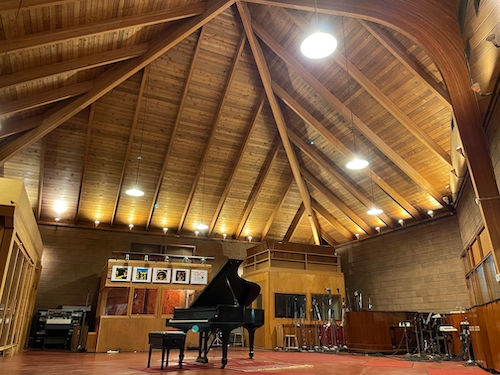Roland Kirk With Jack McDuff – Kirk's Work
- Drew Layman

- May 21, 2024
- 4 min read
Roland Kirk recorded three albums before his deal with Mercury Records in 1961 began a period on major labels that lasted the rest of his all too brief life. Recorded live in Rudy Van Gelder’s Englewood Cliffs, NJ studio on July 11, 1961, Prestige Records released Kirk’s Work later that year after Kirk had signed and recorded an album with Mercury. Prestige couldn’t compete with Mercury’s distribution, and Kirk’s Work would get overlooked upon its original release as We Free Kings, released just weeks later, established Kirk as a force in the national jazz scene. Like his first two records, Kirk’s Work gained more attention and sold more copies when it was later reissued.
Roland Kirk With Jack McDuff
Prestige – PR 7210
1961
Prestige’s Esmond Edwards paired Kirk with another Prestige artist, organist Jack McDuff, and supervised the recording. “With Prestige we primarily worked on a limited budget, and things were, more or less, done in the studio: no rehearsal as a rule, it was the matter of getting compatible musicians together, and to some extent giving them a direction in advance,” Edwards is quoted in a Music Aficionado article. “A lot of times things were ad-hoc. You get four or five guys in the studio and, ‘What are we going to do now?'”
With a playing time of just 33 minutes, Kirk's Work breezes by. But if you’re a lover of jazz organ like me, you’ll want to check it out. New York musicians Art Taylor (drums) and Joe Benjamin (bass) form the rhythm section. In Musicians & Composers Of The 20th Century, Michael Baumgartner notes that the album is something of a tribute with the title alluding to Dizzy Gillespie’s piece “Birks’ Works” and opening with Kirk’s “Three For Dizzy.” And right out of the gate, Kirk plays three horns-alto sax, strich and manzello-simultaneously. McDuff gets a long, expansive solo on the organ and Benjamin gets a short feature of his own on bass towards the end of the track.
Kirk’s sense of humor is displayed throughout the album as shown in both “Makin' Whoopee” and “Skater’s Waltz,” both of which use the themes as starting blocks for improv. Kirk's arrangement of “Skater’s Waltz,”in particular, bears little resemblance to the written work and I suspect Kirk picked it as a nod to the organ’s history in skating rinks. Before long it essentially becomes a jam on the rhythm changes from “I Got Rhythm” and during peak moments or to pass the ball to the next soloist, Kirk hits his siren whistle. This could easily become annoying, but he does it slightly off-mic, and It’s “whimsical and not overdone at all,” as Downbeat noted in its review, which just makes the listener want to smile. I think of it as Kirk thumbing his nose at the jazz snobs, which makes me smile, anyway.
Kirk was recognized as one of the top flute players of his day, and with “Funk Underneath,” it’s easy to see why. You’ll hear more than a little of the technique that Ian Anderson would later use to great success with Jethro Tull. Prestige seemed to think highly of the track, as they’d release it as a single several years later before using it as the name of their 1967 reissue of Kirk’s Work. There’s enough virtuosity on multiple instruments in this early recording that it’s easy to understand why so many critics and listeners found it hard to wrap their heads around everything Kirk was laying down. He was living this music. It was coming out of his pores with his sweat.
Side two opens with the title track, one of Kirk’s four originals on the album. About midway through the track, you can hear Kirk playing the melody on sax while simultaneously playing a chord on the manzello. That’s not an overdub, folks. Rudy Van Gelder recorded an enormous amount of incredible jazz, but still, you gotta wonder what was going on in his head during this session. Prestige also released “Kirk’s Work" as a single. Several reviews single out Kirk’s piece “Doin’ The Sixty-Eight” as one of the stronger tracks. “The percussive rhythms weave a hypnotic Latin groove over which Kirk and McDuff both snake some highly cerebral solos, “ notes Lindsay Planer in her AllMusic review.
Joe Goldberg’s liner notes recount Kirk’s formative years in Columbus trying to make music with a water hose. Had Kirk stuck around town, maybe Hank Marr would’ve sat at the organ. But some folks have to leave town to find what they're looking for, and there’s no doubt Kirk’s decision helped him advance his career and achieve artistic success. Within just the following few months of this recording, Kirk signed with Mercury, recorded We Free Kings, toured with Thelonious Monk’s band and moved to an apartment on Central Park West. He’d already come a long way from the water hose.
Tracklist
Written-By – Roland Kirk
Written-By – Gus Kahn, Walter Donaldson
Written-By – Roland Kirk
B1 Kirk's Work
Written-By – Roland Kirk
Written-By – Roland Kirk
B3 Too Late Now
Written-By – A. J. Lerner, B. Lane
Arranged By – Roland Kirk
Written-By – Charles Emile Waldteufel
Companies, etc.
Record Company – Prestige Records Inc.
Recorded At – Van Gelder Studio, Englewood Cliffs, New Jersey
Published By – Prestige Music
Credits
Tenor Saxophone, Manzello, Strich, Flute, Siren – Roland Kirk
Organ – Jack McDuff
Bass – Joe Benjamin
Drums – Arthur Taylor
Liner Notes – Joe Goldberg
Recorded By – Rudy Van Gelder
Supervised By – Esmond Edwards














Comments